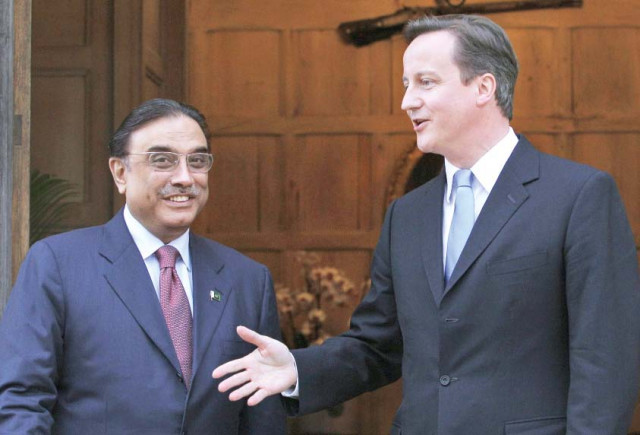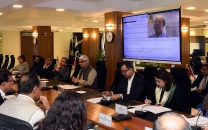Indo-Pak ties: ‘Constraints’ and ‘sleepless nights’
Cables reveal mistrust between President Zardari and Indian PM Manmohan Singh.

In June 2009, President Asif Ali Zardari met Indian Prime Minister Manmohan Singh in Russia on the sidelines of a six-nation summit. The meeting was the first after the 26/11 attacks. A few days later, Zardari told the then US National Security Adviser General James Jones that Singh was “an excellent economist but he’s not convinced the Indian PM understood his constraints”, NDTV reported through Wikileaks.
The then US Ambassador to Pakistan Anne Patterson noted Zardari had “hinted” at “helping Singh to understand them (Zardari’s constraints) was of importance.” She wrote this in a cable to Washington.
Patterson said Jones reminded Zardari to ensure that there was no repeat of a Mumbai-style attack. Patterson noted in her cable to Washington that “Zardari reiterated that Singh was unaware of what it took to ‘change the mind-set of Pakistan’s establishment.”
Terror threats gave Singh ‘sleepless nights’
In the summer of 2009, Singh, newly victorious in the Lok Sabha elections, was quoted as telling US Under Secretary William Burns that “he did not sleep well at night” knowing that intelligence information “demonstrated that the threat of terror attacks after Mumbai was far from over.”
A cable sent from the US embassy in Delhi to brief Washington about the June 11, 2009 Singh-Burns meeting, also quotes the Indian PM as making clear that while he was committed to meeting Pakistan “more than halfway” and “not afraid of talks,” India needed assurances that Pakistan would not be a base for terror directed against India.
“He cautioned if he as Prime Minister was talking peace while Pakistani territory was being used to plan and conduct terror attacks against India, then ‘he would look ridiculous’ in front of the Indian people,” Charge d’affaires Peter Burleigh said in the cable.
Singh was due to meet Zardari in Russia a few days after his meeting with Burns, but demurred when asked by Burns for an assessment of the Pakistani leadership. But Burleigh’s cable quotes him as saying that “India was worried about the growing influence of the Taliban in Pakistan...Singh observed there was a ‘duality of thought processes’ in Pakistan and particularly in the military. There were some who clearly regarded the Taliban and Lashkar-e-Toiba (LeT) as strategic assets.”
Hillary Clinton told Pak to prevent LeT attack on India.
In another revelation, the US seemed to have had information that terror group Lashkar-e-Taiba (LeT) was plotting more attacks in India after the 26/11 attacks. A worried Clinton had issued a warning for Pakistan in a cable sent to the US Embassy in Islamabad.
A cable released by NDTV, through WikiLeaks, sent in June 2009 reads, “Embassy is instructed to underscore to senior Pakistani government officials the critical importance of Pakistani cooperation in preventing Lashkar e-Taiba (LeT) attacks on India. There are credible reports of advanced LeT planning for attacks against India. An attack at this time - especially from Pakistani territory - would undermine progress for regional cooperation, divert resources from the military campaign in the West, and could hinder the USG’s ability to provide Pakistan with military and economic assistance without restrictive conditions.”
The cable then lists points that must be underscored while impressing upon Pakistan how important it was to “eliminate LeT permanently.” Pakistani officials must be told, the missive noted, that the LeT had killed six Americans in the Mumbai Attacks.
It noted that inability to curb the Lashkar would also undermine progress in Pakistan being able to rebuild relations with India and also that, “another Mumbai-style or major LeT attack on India… could close this historic opportunity and could risk a stronger Indian response than that which occurred after Mumbai.”
The release of Hafiz Saeed
In July the same year, Patterson wrote to the US government about the Punjab government’s move to withdraw its appeal challenging the release of Jamaat-ud-Dawa (JuD) leader and 26/11 mastermind Hafiz Saeed, whom she called “the poster child for India’s complaints against Pakistan.” On the face of it, the Punjab government had pleaded that a lack of evidence furnished by and a lack of cooperation from the Pakistan government had forced it to withdraw its appeal.
Patterson saw political overtones for the surprise move of the Punjab government, ruled by the Pakistan Muslim League-Nawaz (PML-N). “The Punjab govt’s surprise move is viewed by Federal officials as a means to embarrass the PPP-led Govt before upcoming talks with India at Sharm-al-shiekh... Punjab’s surprise withdrawal could not have come at a worse time for the PPP-led Federal Govt as it tries to normalise relations with India during scheduled talks on the margins of the NAM summit. Hafiz Saeed is the poster child for India’s complaints against Pakistan and even if Saeed is technically not roaming the streets, Govt of Pakistan’s inability to win the legal case against him is embarrassing.”
The ambassador quoted a senior Punjab official as saying about Saeed, “We don’t have anything against him and our intelligence has nothing to detain him.”
Published in The Express Tribune, May 21st, 2011.



















COMMENTS
Comments are moderated and generally will be posted if they are on-topic and not abusive.
For more information, please see our Comments FAQ